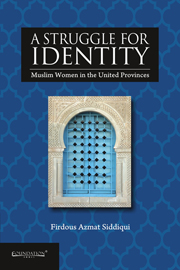Book contents
- Frontmatter
- Contents
- Acknowledgements
- Introduction
- 1 Social Stratification of Muslim Women in the United Provinces
- 2 Socio-religious Movement and the Muslim Women's Issue
- 3 British Perception of Muslim Women: Questions of Fecundity and Health
- 4 Crises in the Social and Economic Identity of Muslim Women: The Great Uprising of 1857
- 5 Changing Profile of Muslim Women through Education
- 6 Patriarchy and Social Obligation of Indian Muslim Women
- 7 Cultural Clash: From Tawaif to Kasbi
- 8 Law, Land and Muslim Women: The Economic Situation
- 9 Muslim Women's Response to the New Judicial System
- Conclusion
- Glossary
- Bibliography
- Index
6 - Patriarchy and Social Obligation of Indian Muslim Women
Published online by Cambridge University Press: 05 October 2014
- Frontmatter
- Contents
- Acknowledgements
- Introduction
- 1 Social Stratification of Muslim Women in the United Provinces
- 2 Socio-religious Movement and the Muslim Women's Issue
- 3 British Perception of Muslim Women: Questions of Fecundity and Health
- 4 Crises in the Social and Economic Identity of Muslim Women: The Great Uprising of 1857
- 5 Changing Profile of Muslim Women through Education
- 6 Patriarchy and Social Obligation of Indian Muslim Women
- 7 Cultural Clash: From Tawaif to Kasbi
- 8 Law, Land and Muslim Women: The Economic Situation
- 9 Muslim Women's Response to the New Judicial System
- Conclusion
- Glossary
- Bibliography
- Index
Summary
Agosh madar voh school hai pahla
Jahan Tarbiat pate hai sare ezaa
Jahan looh sad ape khichta hai naksha
Utarta hai maa ke khayalon ka charba
Altaf Husain HaliSeveral myths and stories tell of women's resistance to male-dominated society. In any discussion on gender, aspects of patriarchy and caste hierarchy—particularly in the Indian context—cannot be overlooked. Janaki Nair connected these two factors with the legal rights of Indian women. Patriarchy often perceives women as merely sources of entertainment and child-producing machines.
This chapter explores the diverse shades of the lives of Indian Muslim women. Indian Muslims lead lives that are very similar to Hindus in most respects, especially vis-à-vis customs and living conditions. A number of local customs, not inscribed in the Quran, prevail among Indian Muslim—chhatti, chilla, manjha, rasm-e mehndi, chauthi, soem; and some obligations such as aqiqa, khatna bismillah khawani and aameen. Some ashra'f Muslims practised only those customs inscribed in the Quran and Sunnah. The dearth of evidence on ajlaf and arzal girls (save what is available in European accounts and oral history) creates a problem: How are they to be depicted in writing? A number of patriarchal folk songs sung on different occasions reflect how these were celebrated in Muslim families, and what the status of women in society was.
- Type
- Chapter
- Information
- A Struggle for IdentityMuslim Women in United Provinces, pp. 109 - 154Publisher: Foundation BooksPrint publication year: 2014



